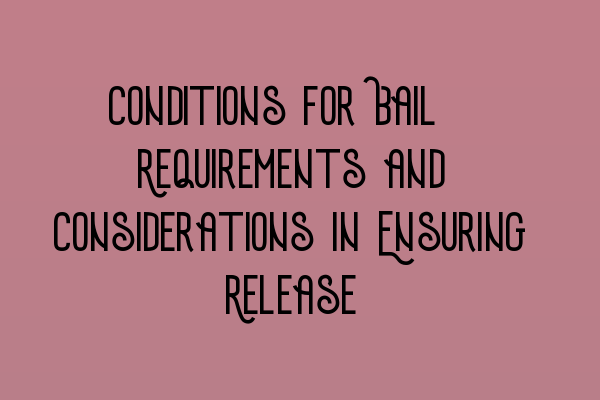Conditions for Bail: Requirements and Considerations in Ensuring Release
When a person is arrested and charged with a criminal offense, one of the key considerations is whether to grant them bail. Bail allows the accused to be released from custody while awaiting their trial, under certain conditions. The decision to grant bail is not taken lightly, as the court must balance the interests of the accused and the safety of the community. In this article, we will explore the requirements and considerations in ensuring the release of a person on bail.
1. Eligibility for Bail
Not everyone is eligible for bail. The court will consider various factors, such as the seriousness of the offense, the likelihood of the accused fleeing, and the potential danger they pose to themselves or others. The court will also consider the accused’s criminal history and their ties to the community. It is important to present a strong case for bail, demonstrating that the accused is not a flight risk and will comply with any conditions imposed.
For more information on the eligibility criteria for bail, you can refer to our related article on SQE 1 Practice Exam Questions.
2. Types of Bail Conditions
When granting bail, the court will impose certain conditions that the accused must abide by. These conditions serve to address the concerns of flight risk and public safety. Common bail conditions include:
- Reporting to a local police station regularly
- Surrendering travel documents
- Restrictions on travel
- Electronic monitoring
- Curfew
It is important to note that the conditions imposed should be proportionate to the circumstances of the case. They should not unduly restrict the accused’s rights or hinder their ability to adequately prepare for their defense.
If you would like further guidance on the types of bail conditions that may be imposed, our related article on SQE 1 Practice Mocks FLK1 FLK2 provides comprehensive information.
3. Bail Variation and Revocation
Once bail has been granted, it is important to comply with the conditions set by the court. Failure to do so can result in the variation or revocation of bail. Bail variation may occur when there is a need to modify the conditions, such as a change in residence or employment. Bail revocation, on the other hand, occurs when there is a substantial breach of the conditions or a material change in circumstances, warranting a reevaluation of the risk.
For guidance on bail variation and revocation, you can refer to our related articles on SQE 2 Preparation Courses and SQE 1 Preparation Courses.
4. Conclusion
Granting bail is a decision that requires careful consideration of various factors. The court must balance the accused’s right to freedom with the need to ensure the safety of the community and the proper administration of justice. By understanding the requirements and considerations involved in ensuring the release of a person on bail, legal professionals can provide effective representation and advocacy for their clients.
For more information on the legal process, including the latest SRA SQE exam dates, please visit our website at SRA SQE Exam Dates.
